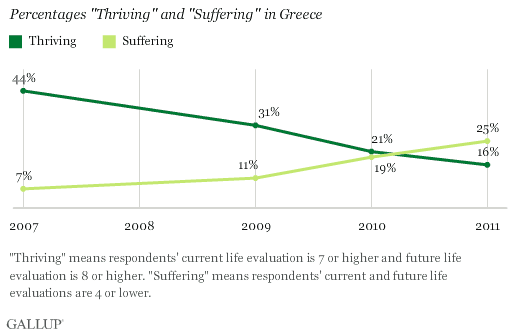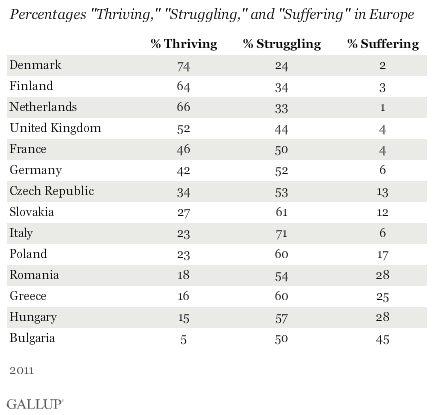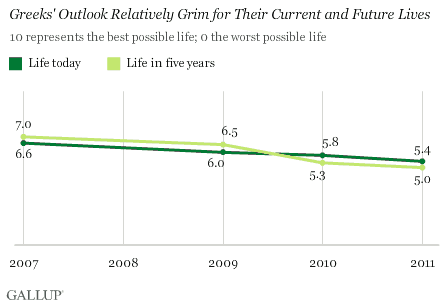BRUSSELS -- The percentage of Greeks who rate their lives so poorly that they are considered "suffering" has more than tripled to 25% in 2011, from 7% in 2007. Greeks are more likely to be suffering than "thriving," a reality uncommon in the developed world.

Gallup classifies respondents' well-being as "thriving," "struggling," or "suffering," according to how they rate their current and future lives on a ladder scale with steps numbered from 0 to 10 based on the Cantril Self-Anchoring Striving Scale. Greeks' current level of well-being is low compared with levels in other developed countries, where thriving is typically much higher than suffering. The results from Greece are based on surveys conducted in the country in April and May immediately preceding the start of major riots and protests against the government's austerity measures.
Greeks' current life evaluation -- with 16% thriving, 62% struggling, and 25% suffering -- is also low compared with ratings in other European countries surveyed so far in 2011. More Greeks are now classified as suffering than those living in several other European nations, including those in other countries hard hit by the financial and economic crisis such as Ireland and Italy. Suffering is higher only in Hungary (28%), Romania (28%), and Bulgaria (45%), and thriving is significantly lower only in Bulgaria.

Greeks' depressed well-being reflects the effect of three years of economic unease on the country's population. The Greek government over this period has passed a series of ever-expanding austerity measures to manage its debt crisis. The severe budget cuts, tax increases, and the loss of public-sector jobs and government services have shaken Greek society and fueled continuous public protests.
Greeks Expect Things to Be Worse in Five Years
Unlike respondents in most European countries, and other countries around the world, Greeks are more likely to expect their lives in five years to be worse than their current lives. Greeks' current and future life ratings have declined each year since 2007. In their average predicted life evaluation, Greeks' ratings are not only among the lowest ratings in Europe, but also among the lowest in the world based on the data available so far from 2011.

Implications
Although Greeks felt the effect of the economic crisis in 2009 and rated their present and future lives worse than in 2007, a majority of Greeks still believed that their situation would improve in the next five years. By 2010, however, as the extent of the financial and economic crisis became clearer and the effects of restructuring more widely felt, Greeks' expectations for improvement in the near future had faded. Greeks are even more pessimistic in 2011, so much so that their well-being is lower than the well-being of residents living in most countries in Europe and is now on par with the well-being of residents living in far less-developed nations.
Gallup has also found more sharply negative life evaluations in other countries where revolts took place, suggesting that these evaluations are a sign that should not be ignored. Greek leaders must work to restore public optimism and confidence to avoid even more serious problems.
For complete data sets or custom research from the more than 150 countries Gallup continually surveys, please contact SocialandEconomicAnalysis@gallup.com or call 202.715.3030.
Editor's note: This article includes revisions to reflect weighting. In most cases, the data shifted one to three percentage points from what was originally reported.
Survey Methods
The 2011 results from Greece are based on face-to-face interviews with 1,000 adults, aged 15 and older, conducted April 14-May 3, 2011. Results from other countries and years are based face-to-face interviews with approximately 1,000 adults per country, aged 15 and older, conducted throughout 2011 as part of Gallup's ongoing global research. For results based on the total sample of national adults, one can say with 95% confidence that the maximum margin of sampling error ranged from a low of ±3.5 percentage points to a high of ±4 percentage points. The margin of error reflects the influence of data weighting. In addition to sampling error, question wording and practical difficulties in conducting surveys can introduce error or bias into the findings of public opinion polls.
For more complete methodology and specific survey dates, please review Gallup's Country Data Set details.
